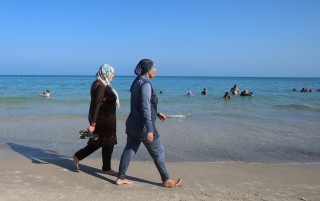In reaction to the Bastille Day attack in Nice earlier this month, several mayors across France enacted the ‘burkini ban.’ In an attempt to promote its staunch laïcité (secular identity), over 30 mayors in France banned the swimwear frequently adorned by Muslim women on the beach, further alienating the Muslim community within the country.
Cannes, a popular city in France, banned the swimwear citing ‘security risks,’ while other towns like Nice and Cogolin gave vague reasons like ‘hygiene’ and ‘maintaining public order.’ Prominent French politicians in support of the ban include Marine Le Pen, leader of the extreme-right National Front who welcomed the ban, saying it will help in fighting for the ‘Soul of France.’ Also, Prime Minister Manuel Valls supported the policy against burkinis, calling the clothing part of “the enslavement of women.”
The backlash since then has been incredible as countries around the world and several international organisations have reacted to the burkini ban, saying it may promote terrorism rather than the desired effect these mayors seek. Instead of helping to heal the country and promote positive peace after an increased number of terrorist attacks, the burkini ban is more likely to stoke tensions. Is the burkini really a symbol of terrorism or just a wetsuit with a hood?
Michael Leiter, former director of the U.S. National Counter-terrorism Centre, said French ban on full-body burkini swimsuits will cause a division in the country, making it more vulnerable to terrorist attacks. “I think it certainly really can cause a schism, and schism is exactly what ISIS will look to take advantage of,” said Leiter, confirming that France may have taken a significant step in the wrong direction with this new policy.
Last week, The Sun, a popular tabloid publication in Britain published an article showing Muslim women dressed in body-covering garments playing joyously on the beach in the seaside city of Brighton. “British Muslims enjoy day at the beach in Islamic dress … while Frenchwomen face arrest for doing the same,” the headline read.
In a recent turn of events, France’s highest administrative court ruled against the ban, suspending it and warning that the ban had ‘fuelled religious intolerance and stigmatisation.’ Essentially, the judges ruled that without any risk to public order, “the emotion and the concerns arising from terrorist attacks,” especially the attack in Nice where a lorry driver killed 86, were “not sufficient to legally justify a ban.”
The United Nations has voiced support for the court’s latest ruling. “These decrees do not improve the security situation but rather fuel religious intolerance and the stigmatisation of Muslims in France, especially women,” Rupert Colville, spokesman for the UN rights office, told reporters.
The current debacle in France is reminiscent of similar discrimination in Nigeria, addressed during the World Hijab Day last year. As Muslim women in Nigeria joined the rest of the world to celebrate the World Hijab Day (WHD) in 2015, a pan-Muslim women’s organisation in the country drew attention to the discrimination, intimidation and harassment Muslim women go through daily because they wear a hijab, a traditional head scarf.
The issue is yet to be fully resolved as women in the country and across the continent continue to be intimidated and discriminated against based on the fact that they put on traditional Muslim attire. This has to be addressed in order to tackle Islamophobia and prevent people from feeling disenfranchised from the government and the state as this makes them more vulnerable to recruitment by terrorist organisations like ISIS and Boko Haram.








